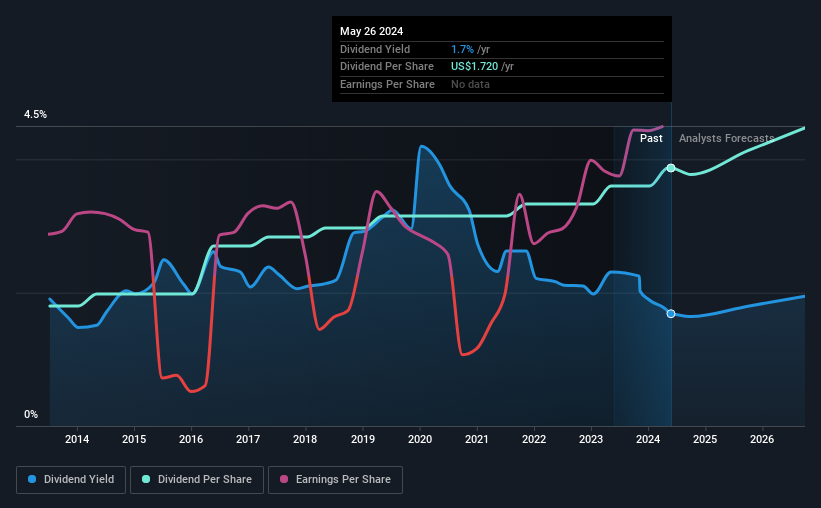Stock Analysis
- United States
- /
- Chemicals
- /
- NYSE:CBT
There's A Lot To Like About Cabot's (NYSE:CBT) Upcoming US$0.43 Dividend

It looks like Cabot Corporation (NYSE:CBT) is about to go ex-dividend in the next 4 days. The ex-dividend date occurs one day before the record date which is the day on which shareholders need to be on the company's books in order to receive a dividend. The ex-dividend date is of consequence because whenever a stock is bought or sold, the trade takes at least two business day to settle. In other words, investors can purchase Cabot's shares before the 31st of May in order to be eligible for the dividend, which will be paid on the 14th of June.
The company's next dividend payment will be US$0.43 per share, and in the last 12 months, the company paid a total of US$1.72 per share. Looking at the last 12 months of distributions, Cabot has a trailing yield of approximately 1.7% on its current stock price of US$102.13. If you buy this business for its dividend, you should have an idea of whether Cabot's dividend is reliable and sustainable. As a result, readers should always check whether Cabot has been able to grow its dividends, or if the dividend might be cut.
Check out our latest analysis for Cabot
If a company pays out more in dividends than it earned, then the dividend might become unsustainable - hardly an ideal situation. Cabot has a low and conservative payout ratio of just 20% of its income after tax. Yet cash flows are even more important than profits for assessing a dividend, so we need to see if the company generated enough cash to pay its distribution. The good news is it paid out just 22% of its free cash flow in the last year.
It's encouraging to see that the dividend is covered by both profit and cash flow. This generally suggests the dividend is sustainable, as long as earnings don't drop precipitously.
Click here to see the company's payout ratio, plus analyst estimates of its future dividends.

Have Earnings And Dividends Been Growing?
Companies with consistently growing earnings per share generally make the best dividend stocks, as they usually find it easier to grow dividends per share. Investors love dividends, so if earnings fall and the dividend is reduced, expect a stock to be sold off heavily at the same time. It's encouraging to see Cabot has grown its earnings rapidly, up 32% a year for the past five years. Cabot looks like a real growth company, with earnings per share growing at a cracking pace and the company reinvesting most of its profits in the business.
Many investors will assess a company's dividend performance by evaluating how much the dividend payments have changed over time. Since the start of our data, 10 years ago, Cabot has lifted its dividend by approximately 8.0% a year on average. It's encouraging to see the company lifting dividends while earnings are growing, suggesting at least some corporate interest in rewarding shareholders.
Final Takeaway
From a dividend perspective, should investors buy or avoid Cabot? We love that Cabot is growing earnings per share while simultaneously paying out a low percentage of both its earnings and cash flow. These characteristics suggest the company is reinvesting in growing its business, while the conservative payout ratio also implies a reduced risk of the dividend being cut in the future. There's a lot to like about Cabot, and we would prioritise taking a closer look at it.
So while Cabot looks good from a dividend perspective, it's always worthwhile being up to date with the risks involved in this stock. Every company has risks, and we've spotted 2 warning signs for Cabot you should know about.
A common investing mistake is buying the first interesting stock you see. Here you can find a full list of high-yield dividend stocks.
Valuation is complex, but we're helping make it simple.
Find out whether Cabot is potentially over or undervalued by checking out our comprehensive analysis, which includes fair value estimates, risks and warnings, dividends, insider transactions and financial health.
View the Free AnalysisHave feedback on this article? Concerned about the content? Get in touch with us directly. Alternatively, email editorial-team (at) simplywallst.com.
This article by Simply Wall St is general in nature. We provide commentary based on historical data and analyst forecasts only using an unbiased methodology and our articles are not intended to be financial advice. It does not constitute a recommendation to buy or sell any stock, and does not take account of your objectives, or your financial situation. We aim to bring you long-term focused analysis driven by fundamental data. Note that our analysis may not factor in the latest price-sensitive company announcements or qualitative material. Simply Wall St has no position in any stocks mentioned.
About NYSE:CBT
Cabot
Operates as a specialty chemicals and performance materials company.
Outstanding track record with excellent balance sheet and pays a dividend.

